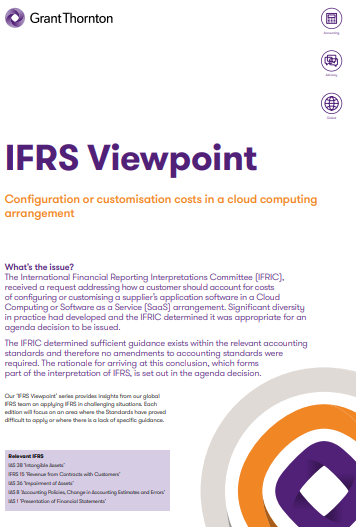-
Corporate Tax
We are your problem solvers for corporate tax issues
-
Restructuring, Mergers & Acquisition
Expertise and creativity for the perfect structure
-
International Tax
We are here, whenever our clients require our assistance
-
Transfer pricing
We are your experts for an optimal transfer pricing structure
-
Indirect Tax & Customs
We take care of your indirect taxes so you can take care of your business
-
Private Wealth
We are your competent partner in the field of Private Wealth Tax Services
-
Real Estate Tax
We are a valuable partner at every stage of your property's life
-
Global Mobility Services
Local roots and global networking as a secret for successful assignment management
-
Advisor for Advisor
As advisors for advisors, we support in complex situations
-
Accounting & Tax Compliance Services
Grant Thornton Austria - Your Partner for Experts for Accounting & Tax Compliance Services. In an evolving regulatory landscape, efficient accounting, tax compliance, and financial statement preparation processes are crucial for maintaining an accurate and up-to-date view of your company’s financial position while ensuring compliance with all legal requirements. We provide tailored solutions that not only save your time and resources but also ensure compliance with complex regulations. Our experts are here to support you, allowing you to focus on your core business.
-
Payroll & People Advisory Services
Ensuring Compliance, Efficiency, and Strategic HR Solutions In an evolving legal landscape, it is crucial for companies of all sizes to have efficient and legally compliant payroll accounting systems. The ever-changing regulations and increasing complexity make this an ongoing challenge. At Grant Thornton Austria, we provide comprehensive, precise payroll processing as part of our Payroll & People Advisory Services. Additionally, we offer customized advisory services to help clients optimise their HR strategy, improve operational efficiency, and minimize potential risks.
-
Tax Controversy Services
Your Partner when it matters most! In increasingly complex environment and considering frequent changes in tax regulations, businesses are facing intensified scrutiny from tax authorities. This has resulted in a significant rise of complex tax audits, investigations and potential disputes. Our Tax Controversy Services are tailored to help you navigate these challenges proactively and effectively. Our experts will guide you through all stages of tax proceedings, ensuring robust defence of your position and advising you on preventive measures to minimize the risk of future tax disputes.
-
Tax Technology Services
Your digital partner for an efficient future! In an increasingly digitalised business world, companies must constantly look for optimisations and adjustments to ensure their long-term success. In order to best prepare for the future and to achieve efficiency increases and process optimisations in the digital area, the experts at Grant Thornton Austria are at your side as a reliable partner as part of our Tax Technology Services.
-
Audit of annual and consolidated financial statements
We place particular emphasis on customized solutions and international service and adapt our services to your needs.
-
Assurance related advisory services
Assurance related advisory services are based on the knowledge and expertise that are the staff of life of our auditors.
-
Global audit technology
We apply our global audit methodology through an integrated set of software tools known as the Voyager suite.
-
Accounting related consulting
Accounting in accordance with UGB, US-GAAP or IFRS is in constant motion. The integration of new regulations into their own accounting systems poses special challenges for companies.
-
Valuation
Valuations are a core competence of Grant Thornton Austria. As auditors and tax advisors we combine profound know-how with our practical experience to offer you customized solutions for your valuation assignment. Our industry expertise is based on years of services to our clients, including listed companies as well as owner-managed companies with an international focus. We advise on valuation matters related to arbitration and provide expert opinions.
-
Forensic Services
When it comes to risks in business, our experts are on hand. We support you not only in suspicious cases or in disputes, but also develop suitable strategies in the area of prevention to avoid serious cases as far as possible. Our Cyber Security team helps you to keep your networks and applications secure and is quickly on hand in the event of a security leak.
-
Cyber Security
Cyber incidents, IT system failures, the resulting business interruptions and the loss of critical data are one of the greatest business risks for companies. Recent cases underline the need for strategic protection and awareness of the issue and require a holistic approach and technical expertise that takes into account all legislative, regulatory and technical aspects of cyber security to protect companies against the daily increase in cybercrime incidents.
-
Sustainability Services
Sustainability is no longer a trend, but the only way to create a future worth living. Our experts will support you in successfully developing your sustainability strategy and preparing your sustainability reporting in compliance with regulations.
-
Transaction Support
We can support you throughout the transaction process – helping achieve the best possible outcome at the point of the transaction and in the longer term.
-
Merger & Acquisition
Companies start new activities and separate from old ones, cooperate and merge. Markets and competitive conditions are subject to constant and increasingly rapid change. As a result, existing business models are changing. Some companies have to restructure and reorganize. But new business opportunities also open up.
-
Restructuring & Going Concern Forecast
Restructuring & Going Concern Forecast: Bundled services for your strategic, operational and financial decisions offer the right answers for companies, banks, shareholders and investors.
-
Internal Audit
Internal Audit helps companies and organisations to achieve their goals by analysing and evaluating the effectiveness of risk management, controls and management and monitoring processes. Internal Audit focuses on independent and objective audit (assurance) and consulting services that improve the value creation and business activities of your company.
-
Expert dispute resolution & advisory
Grant Thornton Austria offers comprehensive services in the field of business-oriented expert services with a broad range of competencies from banking to communication. The core activity of experts is the objective recording of findings and the preparation of expert opinions - regardless of all external circumstances. Our experts Gottwald Kranebitter and Georg H. Jeitler, as sworn and court-certified experts, ensure that the highest professional standards and the principle of objectivity are observed.
-
Blockchain and Crypto-Asset
Blockchain as a carrier technology for crypto currencies and smart contracts, among other things, is becoming increasingly important. Grant Thornton Austria offers comprehensive audit and confirmation services for block chain technologies and business models.
-
International Project Coordination
Our International Engagement Management team is your central point of contact for international projects in all our service lines. We take care of operational project management for you and act as a central point of contact and coordination for your projects. We support companies that start international projects from Austria as well as companies from abroad that want to gain a foothold in Austria or use Austria as a hub for their international projects, especially in the DACH (Germany, Austria and Switzerland) and CEE region.
-
International Desks
As a member of the Grant Thornton network, we guarantee direct access to resources from our worldwide circle of partners. This global connection enables us to seamlessly integrate highly qualified specialists and industry experts from different countries around the world into our teams. Through our broad perspective and diverse expertise, we ensure that we can optimally meet the individual requirements of our clients in an increasingly globalised economy.

The IFRIC determined sufficient guidance exists within the relevant accounting standards and therefore no amendments to accounting standards were required. The rationale for arriving at this conclusion, which forms part of the interpretation of IFRS, is set out in the agenda decision.
What is cloud computing?
Cloud computing is a confusing term that can be interpreted in a variety of ways, with differing consequences. Generally, computing arrangements can be broken into three broad categories.
1. Licensed software on premise
2. Licensed software off premise
3. Software as a service (SaaS)
The IFRIC agenda decision issued in March 2021 relates to this third category SaaS. In this category, the purchaser has been granted a right to access software and use it for their purposes. No right to transfer the software to another platform or to control the method of operation of the software is granted beyond what is contractually agreed.
What was the diversity in practice?
In its consultation on the issue, the IFRIC identified various approaches to customisation and configuration costs for cloud computing arrangements were utilised by companies depending on internal policy. These policies varied from expensing all costs in full to capitalisation of all costs in full, with most entities taking a more nuanced approach in their capitalisation policy and differentiating between expenditure with different underlying fact patterns.
In its agenda decision, the IFRIC determined a nuanced approach indicating IAS 38 ‘Intangible Assets’ was appropriate depending on the facts and circumstances of the projects undertaken and the rights and obligations of the entity as it relates to the individual elements of the projects.
Many entities will find their historic policies, though nuanced, will not conform to the principles as described by the IFRIC.
What does the agenda decision require?
The agenda decision requires management to capitalise those elements of expenditure that meet the definition of an intangible asset as defined by IAS 38 and recognise any additional amounts as an expense as the entity benefits from the expenditure – either by applying IAS 38 or applying another accounting standard. The decision clarified:
- the nature of expenditure that met the definition of an intangible asset
- the methods of differentiating between intangible assets and expenses, and
- the pattern in which the entity benefits from expenditure that does not qualify as an intangible asset.
Intangible asset vs expense
The IFRIC identified the disparity in practice was caused in part by confusion over the definition of an intangible asset and whether costs incurred met the criteria to be recognised as an intangible asset.
Definitions
-
Configuration costs were defined as ‘involving the setting of various ‘flags’ or ‘switches’ within the application software, or defining values or parameters, to set up the software’s existing code to function in a specified way’.
-
Customisation was defined as ‘involving modifying the software code in the application or writing additional code. Customisation generally changes, or creates additional, functionalities within the software.’ (emphasis added).
To assist with this confusion, the IFRIC identified two general ‘buckets’ of implementation cost incurred in a cloud computing arrangement; configuration costs and customisation costs.
An intangible asset is recognisable when it has the following characteristics:
- the asset is separable and transferable from the entity, or arises from contractual or other legal rights
- the asset is a resource controlled by the entity, and
- the entity has the power to obtain economic benefits flowing from the resource and restrict the access of others to those benefits.
From the above, the IFRIC communicated it is typical the software underlying a cloud computing arrangement is not transferred to a customer, and the setting of flags (ie configuration) in third party software does not provide a separable and transferable, or contractual, right to an asset as no asset that is separate from the software has been created.
The IFRIC also addressed the potential for customisation costs to meet the definition of an intangible asset. The IFRIC identified in certain situations, customisation costs may be required to be capitalised. This will be applicable where the entity has engaged resources (internal or external) to create software to which the entity retains intellectual property rights. We note this is generally not the case where code is created for operation ‘in the cloud’ as such additional enhanced functionality generally remains the property of the third part cloud computing provider.
Error or change in policy?
The IFRIC has identified disparity in practice exists and has issued an agenda decision on the basis of clarifying which policies are acceptable. In our view, it is appropriate in this instance to consider the correction of any related recognition and measurement arising from the application of the agenda decision as a change in accounting policy as opposed to a restatement due to an error.
While the form of restatement of prior periods is similar, it is appropriate in this instance to refer to a change in policy as a result of the IFRIC agenda decision as opposed to a restatement due to a prior period error.
When should the policy be implemented?
For certain entities, the adoption of the new policy will result in minimal impact as a result of known limitations in the volume of contracts within the scope of the IFRIC agenda decision.
For other entities, the impact will be broader and may require significant projects to be undertaken to obtain, collate, and make judgements on the underlying information. It is therefore generally accepted the agenda decision may require effort to determine the impact of the agenda decision and adjust the financial statements of an entity; it may also be appropriate for entities to expedite the adoption of a revised policy in response to the agenda decision.
A general expectation has been communicated that all entities will have adopted the new policy by 31 December 2021. We do note, however, that accuracy is paramount. While an entity should seek to expedite adoption, corporate governance will require appropriate controls to be implemented to ensure accuracy in adoption which may require a more deliberate approach to ensure material accuracy.
Want to know more?
Additional considerations and practical application to navigate the process can be found in the full Viewpoint.
Applying IFRSs in challenging situations
Our IFRS Viewpoint series provides insights from our global IFRS team on applying IFRSs in challenging situations. Each edition focuses on an area where the Standards have proved difficult to apply or lack guidance.
We hope you find the information in this IFRS Viewpoint helpful in giving you some insight into a complex IFRS area. If you would like to discuss any of the points raised, please speak to our experts Christoph Zimmel and Rita Gugl.


